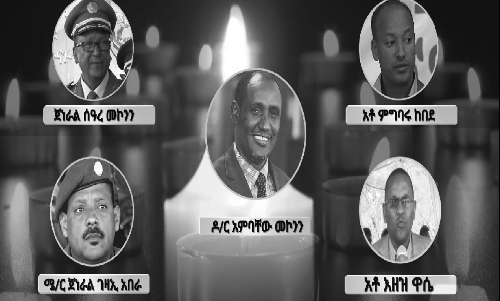
Surreal killings, mourning and burials at the highest places
Political transitions are always full of surprises, twists and turns. Moments of hope are suddenly shuttered by unexpected dark clouds that hover above them. Sometimes the sun brings happiness, at other times heavy rains might be the harbingers of bad times. The first outrageous surprise came exactly last year to the date. The bomb explosion at Meskel Square sent shock waves across the political landscapes. The first drops of innocent blood fell on the tarmac and that was a bad omen. The dead were buried and the wounds seemed to heal for a time. Alas! The demons were only sleeping and when they woke up it was with revenge.
The year 2018 was not a good year for Ethiopia. Much blood flowed after the Meskel square dreadful event. As the demons of ethnic conflicts reared their heads, it claimed the blood of innocent citizens killed in many parts of the country. Hundreds, if not thousands lost their lives in the course of massive internal displacements and mob-inspired terror,
Saturday June 22-2019: Another major shock came last Saturday in the form of a kind of repeat of the events of June 2018 in another form. It all started in the northern town of Bahir Dar where, according to government announcement, a coup had been stage to overthrown the regional administration. Two major political figures were reportedly killed in the attempt. The same day, or rather the same evening, two top military figures were reportedly assassinated in Addis Ababa in mysterious circumstances that were later on reported as linked with evens in Bahir Dar. Another victim succumbed to the wounds he suffered during the Bahir Dar coup. The nation was in deep mourning. Anxiety once again gripped the nation. There were more questions than answers. And the pain was deeper and more devastating than June 2018.
The victims in Amhara regional capital of Bahir Dar were relatively young politicians, who were reportedly the vanguards of the reform process there. The generals who died in Addis were veterans of TPLF’s insurgency against the Derg regime and spent much of their lives in the military. They were teen agers when they joined the guerrilla campaign more than 40 years back and rose in the ranks to attain the highest military rank the country could bestow upon them.
As it later on transpired, these assassinations were masterminded by killers or the leaders of the coup were also top officials in the region who spilled the blood of their own brothers and comrades.
What made these events all the more strange was the fact that top officials of the same ethnic group who fought together and supported the reform process suddenly found themselves on the opposite sides of the barricades and fell victim to sinister intentions that could only came from the minds of deranged personalities. This was what bewildered and confused many observers.
This was also what caused the semantic dispute as to whether to call the event an attempted coup d’état or not. It was also called a criminal act, a power struggle or an attempt to seize power by unconstitutional means. that has been going on within the ruling elites for some time. However, by whatever name the event is called, it remains a crime.
Sunday June 23-2019: The entire country was freezing in shock and disbelief, fear and confusion. Events changed from normal mode to extraordinary and then assumed a surreal nature almost in the blink of an eye. Sunday looked not like a rest day but as the onset of an new political storm. The Internet was shut off. The social media were reduced to silence. Phones rang throughout the day in all corners of the country and the first question was: What happened?
PM Abiy appeared on TV and briefed the nation about what happened and what to expect. He looked and sounded calm although he was visibly angry and determined to proceed on the path of his reform program come what may. His defiance and determination was evident. “ We shall not wobble by what happened!” he said, thanking in his short speech some neighboring countries who offered to come to assist his country in this time of ordeal. “We have the necessary resources to deal with and overcome the crisis by ourselves” was his answer in his characteristic calm and self-confidence. He did not mention who the neighbors he alluded to were. It is to be recalled that the US Federal Bureau of Investigation (FBI) experts had come to Addis to assist in the investigations of last year’s bomb attack at Mesquel Square in which he was targeted.
The government gave temporary explanations, and tried to calm down tempers. Regional governments condemned what happened in Bahr Dar and Addis Ababa. They expressed support and solidarity with the federal government. On the surface, life looked normal; but beneath the apparent normality lurked a collective angst and collective disbelief and much confusion. There were no reliable sources that could tell the people what happened and what was in store. Was all this a minor hiccup or the sign of worse things to come? There was no reliable answer.
Everybody seemed to wait for dawn to break on Monday to see or read the next chapter in the fast unfolding political saga.
Monday June 24-2019: Addis Ababa looked calm on the surface although the aftershocks of the events of the weekend were evident. It was largely business as usual while some instability was reported in Bahir Dar following the routing of the alleged coup makers.
Saturday’s and Sunday’s events looked like they marked a major turning point in Ethiopia’s political transition. They also showed how the transition was fragile and prone to reversal with as much a coup or a series of assassinations. By the speed of its unfolding and impact, Ethiopia’s weekend political crisis seemed to dwarf what is going on in Khartoum next door. The element of surprise was almost unbelievable in the case of Ethiopia.
The causes of the crisis are too complex to draw a complete picture in such a short time. What makes it unique from previous crises is that it was not caused by popular revolt or ethnic conflict but by members of the same regional ruling party that seemingly were at odds with each other. It did not come from below or from the masses this time. It came from above, from members of the ruling elites themselves.
To outside observers and analysts, the crisis appeared as the result of elite fragmentation or elite competition that had always characterized Ethiopian politics at least for the last forty years or so. Political elites from the ruling EPRDF have, on several occasions in the past, been at odds with each other and the frictions were often resolved with bloody reprisals either in secret or in the form of attempted coups. Brigadier General Assamenew Tsige, who allegedly masterminded the failed coup was accused of similar action in the past and sent to jail only to emerge a free man following the onset of the reform process.
According to some analysts who spoke to foreign news media, the crisis has revealed major problems the transition is facing. According to them, the transition is not properly managed or that the leadership has erred in addressing the problems in time and in a swift manner. They pointed out that there were serious gaps in leadership cohesion or consensus and the federal government was unable to impose its authorities on regional issues that led to a dangerous imbalance between federal and regional power sharing and power exercise.
The same analysts maintain that this has in turn encouraged the emergence or creations of different political groups that are acting autonomously outside the jurisdiction of the federal government. Last but not least, they pointed out that the federal government was often more lenient or softer than necessary instead of taking the initiative and acting quickly to resolve accumulated grievances or hidden differences.
This has obviously allowed the emergence of local warlords and political aspirants who are prone to take deadly actions to emerge as undisputed leaders of a given region or locality. If this dangerous trend is not stopped in time, it would destabilize not only the regions but also the center of power and plunge the country into chaos. Ethiopia may not at the moment return to what is called in history as the Era of Princes but things seem to evolve in that direction as long as the central authorities hesitate to apply the full force of the law against dissidents, renegades or would be warlords who, if left alone, might one day become the heads of separatist movements aspiring for independent enclaves.
Tuesday, June 25-2019: As a German radio Amharic service commentator said, Ethiopia lost some the cream of its political and military elites in a mere weekend and prepared to burry its dead, making a heroic sendoff to two of its best generals whose remains travelled to the northern region of Tigray for burial.
Some Addis watchers maintain that the latest crisis has given the government another chance to sit down at the drawing board and review its major priorities. Then it will have to sit down with all the stakeholders and discuss the problems that are frustrating the political transition. This should be an opportune moment to reenergize the political landscape and seek faster solutions to lingering problems that would ignite a more serious crisis next time if left unaddressed.
Other commentators said that the crisis has made it incumbent on the leadership to have a clear road map for the transition period and a commitment to implement it without hesitation and without being softy. Last week’s events certainly dealt a serious blow to government call for love and reconciliation.
The whole nation is no doubt in deep mourning. The lingering question is why and how all this happened and what next? The onus is on the government to give clear and complete account of the events that shook Ethiopia and continue to do so in the coming weeks if not months.
The Ethiopian Herald June 30, 2019
BY MULUGETA GUDETA



